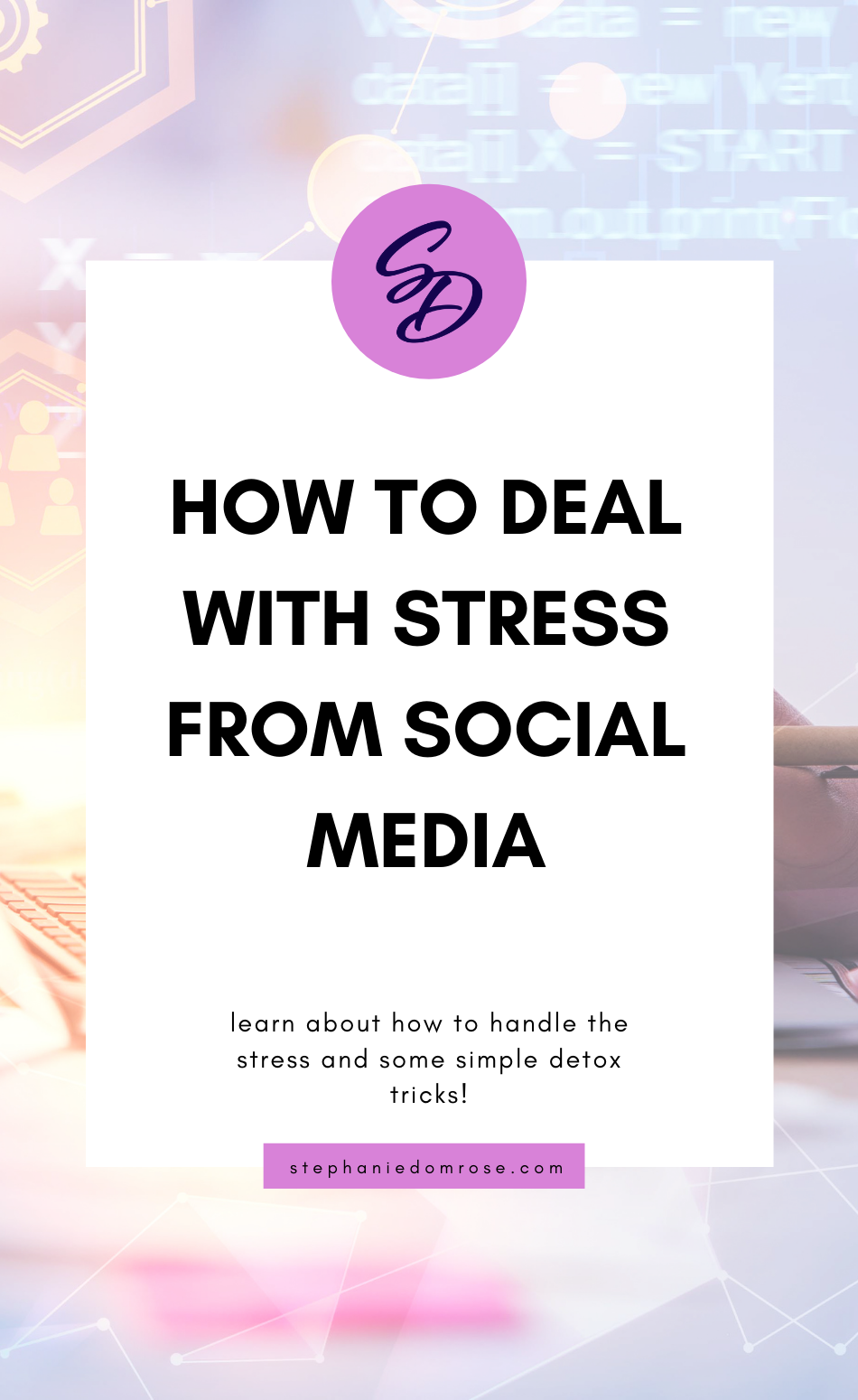With our work, relationships and lives becoming more dependent on technology, our sources of stress are shifting too. Social media is one sneaky aspect of that stress that many of us have mixed feelings about. We want to stay connected with friends and family, it’s VERY socially acceptable and encouraged (despite advice from The Social Dilemma), and for many of us, it’s the only way we are consistently communicating with one another.
All that aside, the social media stress is REAL, and there are some really simple and actionable ways to deal with it. Here are some tips for dealing with stress from social media.
First things first – it’s helpful to understand the stress response in your brain and body.
Simply put, our social media interactions, when left unchecked, are patterned very similarly to a habit:
1. we experience a stimulus: a notification badge, a ding, or a visual cue like your phone screen lighting up.
2. we have a brain + body response: Our brain gets a hit of dopamine because it’s been stimulated, and our curiosity is piqued. Our body feels a rush and we get the impulse to act.
3. We react to the stimulus and the feelings by grabbing our phone/switching browser tabs to check or respond to the notification.
This pattern isn’t unhealthy or stressful in and of itself, it’s just chemistry. The stress comes from a couple things: First, the constant interaction/disruption from our devices, and second, a phenomenon many experts are calling technostress.
Both of these are important to understand so I’ll start with the interruption/distraction. Our brains are not designed to handle constant input of information and distraction that is common with social media use. It’s exhausting for our brains to process the images, videos, text, and information overload we get by scrolling through our social media feeds and studies show, this frequent technological multi-tasking is negatively affecting our ability to focus on any specific task for a prolonged period of time. This might seem like a small problem, but when it comes time to try to focus on something and get it done, social media users may experience heightened stress at how difficult it is to focus and follow-through.
Secondly, let’s better understand technostress. The stimulus-response cycle we experience when we see notifications and respond to them creates feedback loops in the brain that tell us (subconsciously), to keep checking our devices for more stuff, even if we’re feeling stressed out by the activity. Scientists are calling this phenomenon technostress – which I’ve deconstructed in this article if you want to learn more.
It’s pretty clear our social media use is stressing us out, but how the heck do we deal with it?
Many of us are not willing to downgrade to a flip-phone and communicate via snail-mail, so here are some ways to deal with stress from social media and still live your digitally connected life (in an intentional way):
1. Set limits on your tech use internally and externally.
This is a basic exercise in setting boundaries with yourself and your technology and is an excellent place to start. (If you want to be guided through this process, check out this free 5-day social media detox). To set limits on your tech use so you can better deal with social media stress, it’s essential to understand what it is about your use that’s causing your stress in the first place.
I recommend making a list of what’s stressing you out – whether it be certain people, ideas, exhaustion from use, or maybe you aren’t sure yet and you’re just stressed and don’t know why. (That’s okay too!) Once you’ve identified your stressors, it’s time to make an agreement with yourself. What would you like your social media use to look like? What would make it less stressful for you? How many minutes per day do you want to devote to your feeds? Once you’ve decided, write these new ideas down somewhere, and set limits with the help of your technology.
All smartphones have app timers so you can choose to automatically log yourself out at after a specified amount of time. If you’re sneaky with yourself and will login on your desktop after your phone timers run out, you can check out the app Freedom – it allows you to set timers for all your browser tabs and even block yourself from certain websites. They have a free trial if you want to check it out. Set these timers and limits and stick to them. When you get the urge to add more time and stay online, remember you made the decision to cut back to decrease your stress from social media, so it’s an act of self-love and self-care to log off. Sticking to it might seem hard at first, but once you’ve decided it’s what you’re doing, it might be a welcome relief and reminder when the timer goes off and logs you out.
For more ideas about how to set limits and make your technology work for you, check out this article outlining how to do a digital detox.
2. Find a support group or buddy.
FOMO is a real thing when it comes to dealing with stress from social media. We’ve gotten used to seeing everyone’s highlight reel and it keeps us coming back for more every time we’re on our phones. Find a support group of others who are feeling stressed out with their social media use and share your feelings and your goals (ideally in a direct-message format). This will help you feel more supported in the process and when things get stressful you have someone to turn to rather than defaulting to the most stressful activity of social media: the cyclical scroll.
3. Communicate about what you’re doing.
In your process of finding support, it’s important to communicate with others about what you’re doing. Saying it out loud helps with accountability and it will reduce the stress related to worrying about what others will think of your new social media habits. Tell others in a post that you’re feeling stressed and what you’re doing about it. Be clear with your friends and family and you’ll most likely find some support you never knew was there.
4. Take a break.
The best way to deal with stress from social media is to know thyself: are you someone who needs to quit something cold-turkey in order to reset? Or are you someone who does well with creating rules and goals for a new habit and sticking to them on your own? Are you best supported by a group or a buddy? Are you self-motivated? Whatever version you are, you’ve gotta be realistic with yourself and set goals that support your natural way of being or it just won’t work.
Sometimes having some space away from social media can help you get clear on what you actually want and need – and research shows that even ONE day away from your technology can help lessen the stress response associated with the use of apps and social media. Take a day off. Take a week off. Take a month off! Spend some time analyzing how you feel, and use these questions to dive in:
what does my SM provide for me?
Are there less stressful ways to get the same results?
5. Have compassion for yourself.
We’re all struggling with the same addictions and stressors when it comes to social media use. It’s an industry that works hard to keep your attention and get you to re-engage with it over and over again when you decide to step away. Know that you’re not alone, and you WILL slip back into your old habits from time to time! (That’s okay, you’re human). Keep a pulse on how you’re feeling and adjust your social media use as-needed. Remember not to beat yourself up in the process – you’re doing amazing work and ahead of the curve just for researching this topic.
Want some extra support? Schedule a free call with me:



View comments
+ Leave a comment